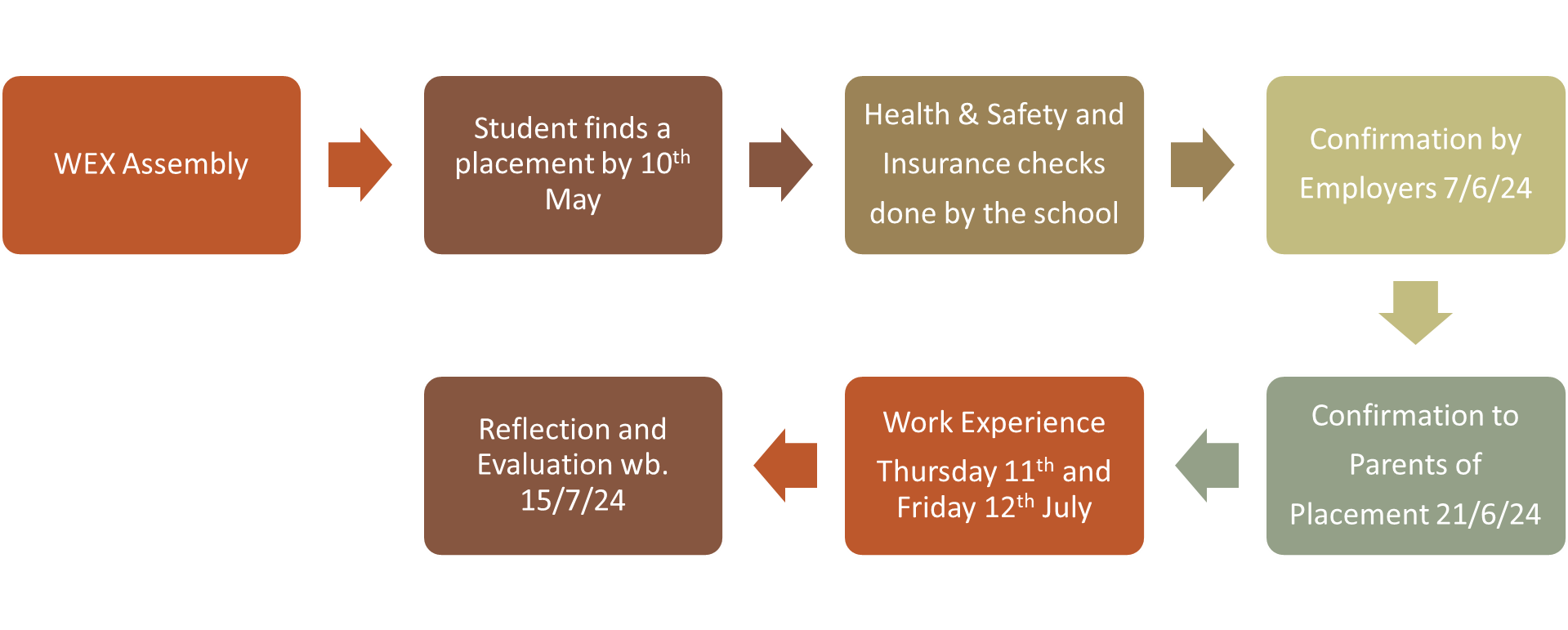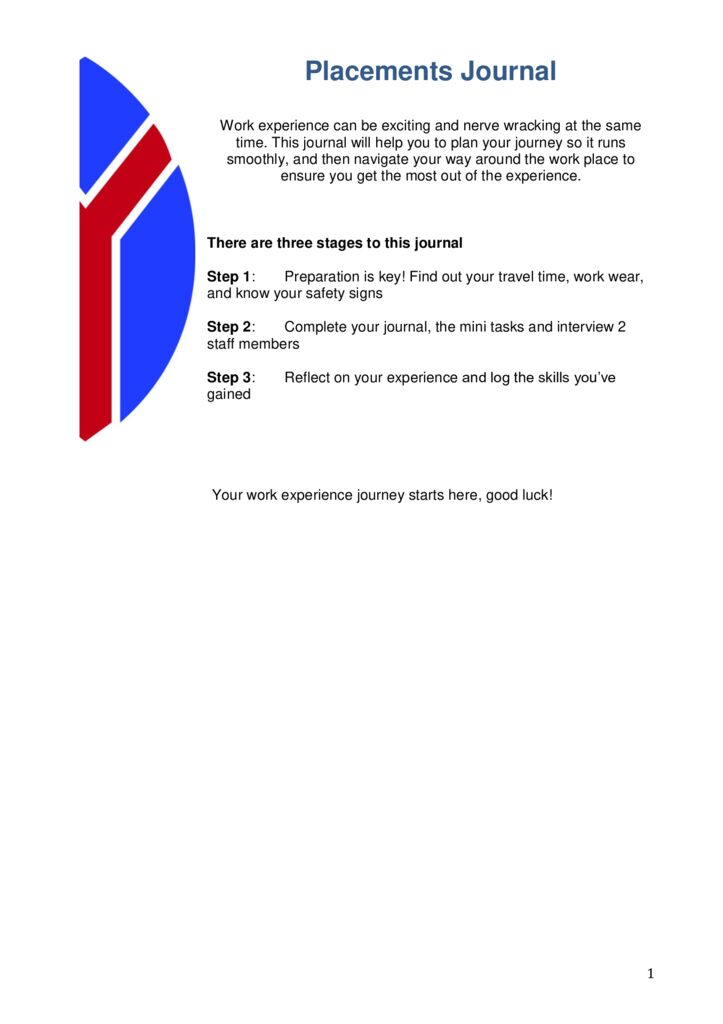Work Experience
Work Experience (WEX) involves every Y10 pupil spending time in the workplace in an adult environment, responding to demands that are often very different to those met in school.
We ask all our Year 10s to complete 2 days of work experience.
Now find out more below about work experience below…
What is work experience?
Work Experience is an opportunity for pupils in Year 10 to carry out real work tasks on employers’ premises and experience as closely as possible the hours, working conditions and disciplines they would encounter as employees. The scheme aims to: motivate pupils towards further education and training; teach them about both the opportunities and the frustrations of working life; allow them to apply the social skills taught in school.
Work experience is important for getting into any career. Having work experience can make you stand out from the crowd on applications for courses, training and jobs.
It’s an opportunity for you to:
- test out your career ideas
- improve your skills
- show your commitment and enthusiasm
When is Work Experience taking place?
Thursday 10th July and Friday 11th July 2025: In the workplace!
WB. Monday 14th July 2024: Reflection and evaluation at Yateley School.
How do I start my Work Experience journey?
Don’t worry if you’re still not sure about the kind of career you want. Work experience is a great way of trying out a career to see if it’s for you.
Before you start to look into what specific careers it can helpful to think about what you like to do and where you feel your strengths lie. Ask yourself the following questions:
- What are my favourite subjects at school or college?
- What subjects am I good at and which ones do I find more difficult?
- What do I enjoy doing outside school or college? Could I turn my hobby into a career?
- What jobs have I heard about or seen other people doing? Could I see myself doing any of these jobs?
It can be helpful to speak to friends, family members and your teachers about their careers and how they got there. These conversations will help you start to get an idea of what different jobs are like and what qualifications and experiences you will need for particular careers.
You can also find lots of useful careers information and planning tools online. Some services are provided by government while others are run by private companies, funded through advertising.
- National Careers Service (England) – explore over 800 job profiles, match your skills and interests to potential jobs and speak to a careers adviser
- Future Morph – careers website created to show that studying science, technology, engineering or maths beyond the age of 16 isn’t just a one track road to becoming a scientist or engineer!
- Success at School – explore different careers, find out about top employers
- Prospects – careers advice and jobs for school leavers, graduates and professionals
- Plotr – contains lots of useful information and a quiz to help you narrow down your list of options
What is the timeline for work experience?

How do I apply direct to national organisations?
Many well-known large businesses such as Tesco, Pizza Express and HSBC operate their own work experience programmes for school and college students. It’s not just commercial organisations which operate such programmes, larger charities and public sector organisations will often have their own schemes, too.
The easiest way to find out whether an organisation operates its own work experience programme is by searching for the name of the business online followed by the words work experience. This will direct you to a page on their website, explaining how students should go about applying for a placement.
How do I apply to small/medium businesses?
Small and medium-sized businesses (often referred to as SMEs) account for 60% of all private sector employment in the UK so you shouldn’t rule them out as a source of work experience placements.
Placements with smalls businesses can give students valuable experience of different aspects of a business and insights into what it takes to run a successful business.
The first thing to do is to ask your colleagues, friends and family members who live locally if they know of any small businesses that would be happy to host. You’ll be surprised what you discover this way.
Should I approach businesses that don’t advertise work experience?
Don’t let the fact that a business does not advertise work experience opportunities put you off from asking if they’ll take you on!
Small and medium-sized businesses in the UK may not have the time to formally advertise work experience placements every year. If you’re interested in what a business does, it’s worth contacting them to see if they’d offer you work experience.
How you approach contacting a business will vary from business to business. It can be a good idea to speak to the manager or owner, either in person or by phone, before making a formal application. Speaking to a person beforehand should give you an idea of whether a business is open to offering work experience. Should your initial contact be positive, you can then ask the business whether they would like you to make a formal application.
Although it’s often better to speak to a business beforehand, don’t be afraid to send off speculative emails to businesses you are especially keen to work for. A brief email explaining why you want to do work experience at the business, along with your CV, demonstrates your initiative and self-motivation, two qualities employers’ value greatly.
What insurance should the employer have to provide work experience opportunities?
Most workplaces require Employer’s Liability Insurance by law, and this is sufficient coverage for employing work experience students. However, their insurer must be a member of the Association of British Insurers (ABI) or Lloyds.
Next steps…
- Once WEX placement is confirmed with employer, parent should complete the Work Experience form.
- Yateley School will then contact employer for further Work Placement details and to complete the Health & Safety Risk Assessment.
- Once H&S Checks completed, a confirmation email will be sent to parents.
Please note: It is responsibility of students to confirm final details such as lunch arrangements, start & end times, dress code etc with employer nearer the start date.
Joining us...
To find out more about Yateley School and joining us as a student, sixth former or staff member click below!
